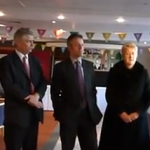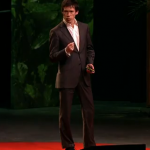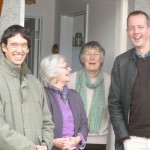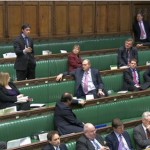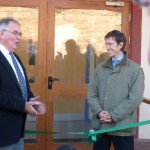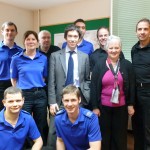It has been a tough winter already and it is difficult not to think we are entering many years of harsh winters. Government must radically improve its response to everything from fuel poverty to the condition of our roads. The snows cancelled some of the fairs, which I was looking forward to seeing, from Bampton to Brampton, and the Sunbeams group had to cancel their performance in Tirril. But, through all the cold and problems, it has still been a very musical Christmas, charged with different traditions. A mother and daughter singing ‘Once in Royal’ purely and beautifully in an ancient hall in Orton, (with the father on the piano), could have been singing anytime in the last hundred years. In Wigton, there were Bob Dylan solos in the Methodist Chapel, a parade with a steel band, a rock group and a performance of a Joseph from a Carlisle pantomime star before the carols began. In Penrith, the gentle light of the paper lanterns and the hundreds of voices from every corner of the square, carried very ancient shadows and echoes.
The carol service in St.Margaret’s Westminster was also beautiful but the end of parliament was tumultuous. While I was making a speech in support of Cumbrian Community pubs, a thousand students could be heard chanting outside and missiles (which seemed to be snooker balls) were bouncing noisily off the roof of the chamber. I enjoyed the Any Questions’ radio show in Kendal. But two minutes before I went live on air, I slammed a finger in a heavy door, and my attention wavered a little between universities, criminal justice reform and guessing when my fingernail would drop off. When I was asked what book I would give a child for Christmas, my mind went blank. I finally suggested a book about the young King Arthur that I enjoyed as a seven year old. But the more experienced politicians, who followed me, apparently had much more advanced ideas for modern children. One recommended “Schindler’s List” and Andy Burnham suggested the ideal stocking would include the Socialist parable “The Ragged Trousered philanthropists” and Conrad’s account of the African slave trade, “Heart of Darkness”. Since Andy Burnham had been Health Secretary, I showed him my finger off stage and he replied, ‘I was a spin-doctor, I’m afraid, not a doctor.’ When I showed the finger to Catherine, she cried, ‘You’ve done it on purpose,’ she cried, ‘haven’t you? To get out of signing the Christmas cards…’ But Penrith community hospital did a wonderful repair job on the Saturday morning and we have been able send out a Christmas card, designed by Ellie Morton, who is 6 from Plumpton school. The angels are set against a dark blue sky.
Cumbria at Christmas, powerfully reminds of so much good in the world. My favourite event was the fair at Brough. More than 500 out of a total Brough population of 900 are involved in putting on the fair. There were men wobbling on penny farthings, a youth committee raising money for a kick-wall, children in Victorian fancy-dress, a long tail competition for dogs and a church room with sticky toddlers making Christmas decorations. The parade featured vintage tractors, a large steel band, (led by a man in orange with an electric guitar and a cowboy hat), a very smart detachment of air cadets with their colours (one of them has just been selected for pilot training), dancing girls in leopard skin hoods, mobility scooters, the scouts and a Shetland pony, pulling Santa. A vintage bus ran services back and forth to Kirkby Stephen. The archdeacon of Carlisle, the chair of the District Council and the mayor led the procession. The fair was opened by the High Sherrif of Cumbria, in knickerbockers and sword, reading the medieval charter of Brough, issued by King Edward. And in case anyone though it was too serious, Queen Victoria appeared in full black bombazine to take the salute.
Nor will I forget hobbling through the hall, in stiff plastic boots and too much clothing, the Sunday morning of the Penrith Christmas lights, with skis on my shoulder and sticks in my hand. The sky was so dark, the sun so bright and the snow so crisp that I felt I was at six thousand feet. Only the great ash trees, the low white-washed farm-houses and the Swaledale ewes reminded me that I was outside my front door. Soon, instead of splashing through soft uneven ground, I was gliding over snow. The hoof-tracks of fell-ponies and the bleached moss on the boulders were all hidden. The sunlight gleamed off the ice-crystals. And with each pole plant, each thrust from one ski to another, each breath, the world grew simpler and more silent. When on Loadpot hill, I stripped off the skins and ski-ed down again, I could see russet tips of grass were visible through the powder. I half-recognised limestone ridges as I crossed them and had to hop flowing becks. Close to home, I lifted my head and absorb the changing shapes of the white valley fields as they rushed towards me. The dark blue sky, was the same sky that Ellie painted behind her angels.






